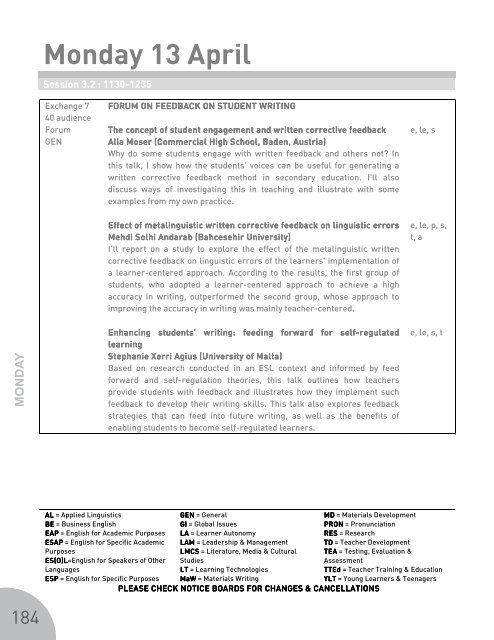You also want an ePaper? Increase the reach of your titles
YUMPU automatically turns print PDFs into web optimized ePapers that Google loves.
Monday 13 April<br />
Session 3.2 : 1130-1235<br />
Exchange 7<br />
40 audience<br />
Forum<br />
GEN<br />
FORUM ON FEEDBACK ON STUDENT WRITING<br />
The concept of student engagement and written corrective feedback<br />
Alia Moser (Commercial High School, Baden, Austria)<br />
Why do some students engage with written feedback and others not? In<br />
this talk, I show how the students’ voices can be useful for generating a<br />
written corrective feedback method in secondary education. I'll also<br />
discuss ways of investigating this in teaching and illustrate with some<br />
examples from my own practice.<br />
Effect of metalinguistic written corrective feedback on linguistic errors<br />
Mehdi Solhi Andarab (Bahcesehir University)<br />
I'll report on a study to explore the effect of the metalinguistic written<br />
corrective feedback on linguistic errors of the learners' implementation of<br />
a learner-centered approach. According to the results, the first group of<br />
students, who adopted a learner-centered approach to achieve a high<br />
accuracy in writing, outperformed the second group, whose approach to<br />
improving the accuracy in writing was mainly teacher-centered.<br />
e, le, s<br />
e, le, p, s,<br />
t, a<br />
MONDAY<br />
Enhancing students’ writing: feeding forward for self-regulated<br />
learning<br />
Stephanie Xerri Agius (University of Malta)<br />
Based on research conducted in an ESL context and informed by feed<br />
forward and self-regulation theories, this talk outlines how teachers<br />
provide students with feedback and illustrates how they implement such<br />
feedback to develop their writing skills. This talk also explores feedback<br />
strategies that can feed into future writing, as well as the benefits of<br />
enabling students to become self-regulated learners.<br />
e, le, s, t<br />
AL = Applied Linguistics<br />
BE = Business English<br />
EAP = English for Academic Purposes<br />
ESAP = English for Specific Academic<br />
Purposes<br />
ES(O)L=English for Speakers of Other<br />
Languages<br />
ESP = English for Specific Purposes<br />
GEN = General<br />
GI = Global Issues<br />
LA = Learner Autonomy<br />
LAM = Leadership & Management<br />
LMCS = Literature, Media & Cultural<br />
Studies<br />
LT = Learning Technologies<br />
MaW = Materials Writing<br />
MD = Materials Development<br />
PRON = Pronunciation<br />
RES = Research<br />
TD = Teacher Development<br />
TEA = Testing, Evaluation &<br />
Assessment<br />
TTEd = Teacher Training & Education<br />
YLT = Young Learners & Teenagers<br />
PLEASE CHECK NOTICE BOARDS FOR CHANGES & CANCELLATIONS<br />
184


